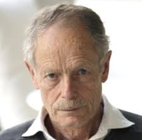
Translated from the Italian by Patrick Williamson
Translator's Note
These seven poems are from the first sequence in Erri de Luca’s second book of poetry, Solo Andata, Righe che vanno troppo spesso a capo (One Way, Lines that break all too often), Feltrinelli, 2014 (2005). Neapolitan by birth, Erri de Luca is one of the most renowned writers in Italy today. I first heard Erri de Luca present his work, with great humour and numerous Neapolitan anecdotes, during an interview at Più libri più liberi in Rome in December 2015. During this event he recited his laic prayer for migrants Mare nostro che non sei nei cieli (Our sea which art not in heaven) which I decided to translate it there and then as I was drawn by the compassion that he expresses. I subsequently chose to translate the Solo Andata sequence, which is a lament for immigrants from Africa trying to make it across the Mediterranean to Italy. Erri de Luca places himself very much in the shoes (or rather the ‘bare feet’) of those making this perilous journey. De Luca is convinced that a writer, as a public figure, has a duty to speak for those who cannot and find words for the inarticulate. He speaks through the senses and from the underbelly of the human condition, aspiring to go to the very core of words, and to the entrails of social, political, and spiritual integrity.
Chorus
The men left their prayers on land,
everyone’s God not to blame for the journey.
No invocation, no plea for help, from here,
only a greeting to the king of the universe.
If we were on land all these nights we’d sing
for herds moved to the highlands.
We’d drive the lions away with song,
women would tend to the fire in the stone circle.
Our bodies do not cast shadows on ground here,
we are dust raised, a vinegary smell in an empty flask.
We are the desert that walks, people of sand,
iron in our blood, lime in eyes, a leather sheath.
Many destroyed lives paved the way for the journey,
steps we stole from others push our feet forward.
__
Chorus
Soldiers torch the village while we’re in the pastures,
throw man and beast, yarn and white-beard, to the fire.
Slaughter the well with dynamite, demolish the plants,
roll children’s heads around with the tips of boots.
Let us go back the smouldering campfire is still warm
the murderers sing under the elders’ walnut tree.
Driven from the land, we are seed spat the furthest
from a felled tree, we end up in the fields of the sea.
Use us for yourselves, ore of life to be exploited,
plant, metal, hands, worth much more than a workforce.
Our country is the fresh ashes of old men and animals,
it left in the wind before we did, it will have arrived already.
You never seen a country migrate? We from Africa have,
it rises up as smoke from fires, it is scattered like manure.
__
One man’s story
The moon waxes night and day, distended,
we empty the meal we finished, in whispers.
We don’t bury the dead in the sea, we use their bodies
at night to cover us against the cold, the sea has no flies.
The moon salivated on blue highland pastures,
the pregnant ewes filled our arms with lambs.
The moon here gleams on empty arms, silent children,
no dogs fight over the placenta, for their share.
Our faces blanch at night, feverish with thirst,
we lick dew from cloth, from wood, at sunrise.
We are all equal, as strict as equality can be,
right up to the last drop of condensation.
__
The murderers did not get this far,
the distance from them barred by the journey’s fallen.
If you die at sea, it is a loyal death,
of drought-struck trees under the clouds’ milked breasts.
I wash crusts of blood from the boat,
it is a clean bowl and we are the dish.
This is our life, kneaded and unleavened,
bread sent out over the face of waters.
They saw us kill, say our prayers, the children
that crouch at our feet with a yawn.
Kept warm by spent bodies we forge an alliance
between desiccated life and the breathing.
__
The slightest cloud makes the wind die down,
the sea becomes a hospital for a spell.
If you listen to the breath of scattered bodies,
then peel the clouds away, the wind picks up.
Driven from Africa, it accompanies us north,
son of the sun, father of drought.
The wind in Africa seeks the water of eyes,
coriander, mustard seeds enter the white, and blind.
The wind at sea is weightless, carries no desert grain,
it covers dark eyelids with blue salt.
The salt blanches the children’s temples
which burn with hunger, we bathe them with the sea.
Merchants with their camel trains
brought the salt we lacked in the highlands.
The treasure of salt, to taste and keep,
we exchanged for skins and flaming horns.
Now we are coated with it, a bitter crust,
this wealth toys with us, to remove, to give.
__
The elder wasted his remaining spit to speak:
now it’s his turn to remember to exist.
He lay flat to look at the herds of clouds,
they travelled in his pupils, I closed his eyes.
I cannot shut mine, they don’t want sleep,
they burn with sleep, they see sea become a fire.
The distant hunchback waves become hills,
their crests fold into white shapes of sheep.
This is delirium, make it back home, to die there,
to see the familiar landscape, in your place.
The dogs at the corner, at the village walnut’s spot,
bound up to you, greeting, to celebrate.
Dogs not angels wait for us at the gates,
the dogs that loved our hands.
We have eaten of you, we have fasted of you,
give us tomorrow’s bread today.
__
Hands grabbed me, customs officials from the North
swabbed, in plastic gloves and surgical masks.
They separate the dead from the living, the sea’s harvest this is,
thousands of us confined in a place for hundreds.
Italìa, Italìa, is this Italìa ? Their vowels full of air,
they’d good words to say about their country.
“They say Itàlia and this one of its islands
of capers, fish, and us all confined.”
I no no wétin be ailan , I say and he replies:
“Land stuck in the middle of the sea”.
And it does not move? “No, land imprisoned by waves,
like us in an enclosure. “Ailan no is arrival”.
__
Notes
[1] The migrants pronounce the name of the country wrong with the stress on the ‘i’ not the ‘a’, as corrected later on,
[2] The phrase ‘”Non so che cosa è isola” or “Isola non è arrive” is slightly ungrammatical in the original. A native speaker would say “Non so che cosa è un’isola” or , “Un’isola non è l’arrivo” respectively. The translator has used Nigerian Pidgin to reflect the language of the migrants being different from standard English.



























0 Comments